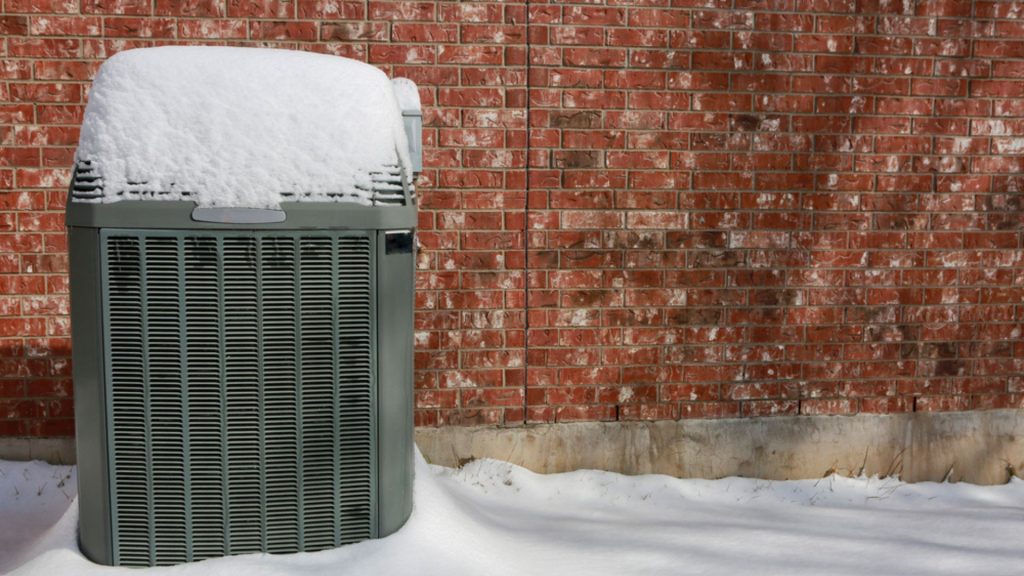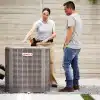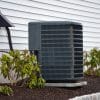If you live in a place where it’s occasionally cold, you might wonder if you can use your air conditioner to cool down your home when it’s chilly outside.
Maybe you want to get some fresh air, reduce humidity, or just because you are used to having the AC running at the desired temperature.
But is it safe to run your AC when it’s cold outside? The answer depends on what kind of AC system you have and how cold it is. Let’s find out!

Does AC work when it’s cold outside?
AC can work when it’s cold outside, but it’s not recommended. Cold weather can negatively affect the refrigerant, the coils, and the compressor of the system. You should use an AC system that has features to protect it from low temperatures or heat your home.
Now that you know it may cause more harm than good, it’s better to understand how a typical central air conditioning system works and how it’s affected by cold weather.
We will also bring several tips to run AC during cold weather and options for you to not have to run AC during winter.
How does a central AC system work?
A central air conditioner works by transferring heat from inside your home to outside. It does this by using a refrigerant, a substance that changes from liquid to gas and back again as it absorbs and releases heat.
The refrigerant flows through a series of coils and pipes that connect the indoor unit (the evaporator) and the outdoor unit (the condenser).
When you turn on your AC, the refrigerant enters the evaporator as a cold liquid. As the warm air from your home passes over the evaporator coils, the refrigerant absorbs heat and turns it into a gas. The gas then travels to the condenser, where a fan blows air over the coils.
The refrigerant releases heat to the outside air and turns it back into a liquid. The liquid then returns to the evaporator through an expansion valve that lowers its pressure and temperature.
This cycle repeats until your home reaches the desired temperature set by your thermostat.
What Happens When You Run Your AC in Cold Weather?
When it’s cold outside, this process can be disrupted or damaged by several factors:
Low outdoor temperature: If the outdoor temperature is below 15 degrees Celsius, the condenser may not be able to release enough heat to cool down the refrigerant. This can cause high pressure in the system and damage the compressor or other components.
Frozen coils: If there is moisture on the evaporator or condenser coils, they can freeze when exposed to cold air. This can block or restrict airflow over the coils and reduce their efficiency. Frozen coils can also cause leaks or cracks in the pipes due to the expansion and contraction of ice.
Thickened lubricant: The compressor needs lubricant oil to run smoothly and prevent wear and tear. However, when it’s cold outside, the oil can become too thick or viscous for proper circulation. This can cause friction or overheating in the compressor motor.
The mentioned factors above are worth considering, otherwise, you may need to call a professional AC repair service anytime soon.
What Kind of AC System Can You Use in Cold Weather?
If you want to install an AC system, keep in mind that not all AC systems are designed for cold weather operations. Some have features that protect them from low temperatures or allow them to provide heating as well as cooling.
Here are some examples of AC systems that can work when it’s cold outside.

1. Ductless mini-split systems
A ductless mini-split system is an AC system that consists of one or more indoor units connected to an outdoor unit by refrigerant lines. Unlike central AC systems, ductless mini-split systems do not use ducts to distribute air throughout your home.
Ductless mini-split systems are more efficient than central AC systems because they avoid duct losses (heat loss or gain through leaky or poorly insulated ducts). They also allow you to control each indoor unit separately according to your comfort needs.
Some ductless mini-split systems have low ambient sensors that prevent them from running when it’s too cold outside. Others have built-in heaters that supplement their cooling function with heating functions. These features make them suitable for cold weather operations.
Window units
A window unit is an AC system that fits into a window opening or a wall slot. It has both indoor and outdoor components in one box.
Window units are usually cheaper than other types of AC systems, but they are also less efficient and less durable. They also tend to be noisy and block natural light.
Some window units have thermostats that limit their lowest setting to 15 degrees Celsius. Others have vents that allow you to let in fresh air from outside. These features can help them work better in cold weather, but they still pose a risk of freezing or damaging the coils or the compressor.
Conclusion
Does AC work when it’s cold outside? The answer is yes, but it depends on what kind of AC system you have and how cold it is. Running your AC in cold weather can cause problems such as high pressure, frozen coils, thickened lubricant, and reduced efficiency.
If you’re not sure if your AC system can work in cold weather safely and effectively, you should consult a professional HVAC company. They can inspect your system and advise you on the best course of action for your comfort and safety.



